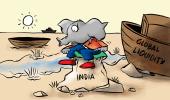We have the workforce, now we need to ensure that we take full advantage of game-changing technologies and geopolitical openings, suggests Jayant Sinha, chairman of Parliament's Standing Committee on Finance.

My recent essay on 'grey rhino' events -- predictable events that can trigger major crises -- provoked many comments.
Several commentators objected to my highlighting only downside surprises to India's economic growth.
Surely, they argued, there are external events that could accelerate, rather than stall India's growth?
On reflection, I realised that they are correct.
Upside surprises are equally possible -- these include generative artificial intelligence (AI) technology, innovative new battery chemistries, the development of commercial nuclear fusion, and increased manufacturing investment in India due to China risks.
Each of these developments could have a significant positive impact on India's growth and offset some of the downside risks that we face.
AI is a miraculous technology available now that will surely spur economic growth.
AI can automate many routine tasks and equip humans to become much more skilled and productive.
AI-driven chatbots can teach humans efficiently, help them become better learners, and develop higher-order skills.
Generative AI can assist in major creative breakthroughs by rapidly coming up with novel solutions, such as in drug discovery, diagnostic imaging, and battery chemistry.
Further, augmented and virtual reality goggles are already demonstrating how this type of limitless intelligence can become universally accessible.
Every person will eventually have an AI assistant always at hand.
Generative AI will be a particularly important force multiplier for India. We have the world's largest and youngest workforce.
To date, our workforce has been constrained by our ability to educate and skill workers on the most advanced technologies and work practices.
With AI assistants available to customise and endlessly coach workers, India could leapfrog the need to build vast educational complexes.
Multiple Indian start-ups are already working on these types of AI platforms -- anyone of them could become a global disruptor and transform India.
Another game-changing technology for India could be innovative battery chemistries.
Our net-zero pathway hinges on transitioning to renewable technologies that do not emit greenhouse gases.
Unfortunately, renewables (solar, wind, tidal, and hydro) are intermittent energy sources that do not produce round-the-clock (RTC) power.
Renewables have to be coupled with massive energy storage facilities to be able to provide RTC power.
Typically different types of batteries are used to store renewable energy and provide power when required.
In addition, batteries are also required for transportation vehicles.
Our demand for various types of energy storage is thus virtually inexhaustible.
Today, the world relies on lithium-ion battery chemistry for both large-scale energy storage as well as for transportation applications.
Lithium-ion is a mature, cost-effective technology that has demonstrated excellent performance in the real-world.
Unfortunately, most of the lithium-ion supply chain is controlled by China and lithium can only be commercially mined in a few countries.
The global North is rapidly diversifying away from lithium-ion batteries made in China, but it may be very difficult for India to establish a full lithium-ion supply chain in the next 10-20 years.
This is a major vulnerability and could cripple our decarbonisation efforts.
There are several alternative battery chemistries that are possible, including aluminium-air, iron-air, zinc-air, and solid state lithium-metal.
Each of these is still about a decade away from full-scale commercial adoption, but they are all superior to lithium-ion in terms of mineral availability, energy density, power generation, and affordability.
If we are able to develop or acquire these technologies, then we will be able to solve our energy storage challenges and be able to move much more rapidly to net-zero.
India has always been strong in chemical and material sciences, and several Indian start-ups are working on these new battery technologies.
To scale-up our own indigenous energy storage ecosystem, our battery standards must be chemistry-agnostic, significant venture capital (VC) funding must flow into battery start-ups, and we should consider even more ambitious production-linked incentive (PLI) schemes.
Energy storage may become just a transitional technology if commercial nuclear fusion takes off.
It is ultimately the sun that powers all energy sources on our planet.
If we can harness the nuclear fusion that drives the sun's radiation, then humanity will have unlocked zero-emission, infinite energy.
Today, there are many well-funded start-ups that are getting ever closer to commercialising nuclear fusion.
Given recent advances in material science and AI, many experts believe that in the next 20-30 years, the US will be able to develop commercial nuclear fusion reactors.
India must continue to strengthen its scientific and technological partnerships with the US, so that we are able to rapidly scale-up fusion reactors across the country.
If we can harness this inexhaustible energy source, we will be able to ensure sustainable prosperity for all Indians.
A final upside surprise for India could be a rapid shift away from China as a manufacturing base.
Only India has the workforce, technology base, market size, and political stability to rival China as a production platform for global companies.
With China becoming less attractive due to its intensifying rivalry with the US, we could start to attract hundreds of billions of dollars of manufacturing investments.
This is already happening in services through global capability centres, and it appears that the large-scale migration of electronic, automotive, chemical, and pharmaceutical supply chains is also beginning.
To take full advantage of this extraordinary geopolitical opportunity, our states must roll out the red carpet to global companies with outstanding infrastructure, flexible labour policies, expedited land acquisition, business-friendly decision-making, and excellent educational systems.
Make no mistake. Fast, sustained gross domestic product growth is driven by productivity growth propelled by the adoption of advanced technologies, resulting in surging exports and workforce expansion.
We have the workforce, now we need to ensure that we take full advantage of game-changing technologies and geopolitical openings.
To avoid India being pummelled by a series of grey rhino crises, our start-ups and companies must capture these opportunities.
Jayant Sinha is an MP from Hazaribagh.
Feature Presentation: Aslam Hunani/Rediff.com











